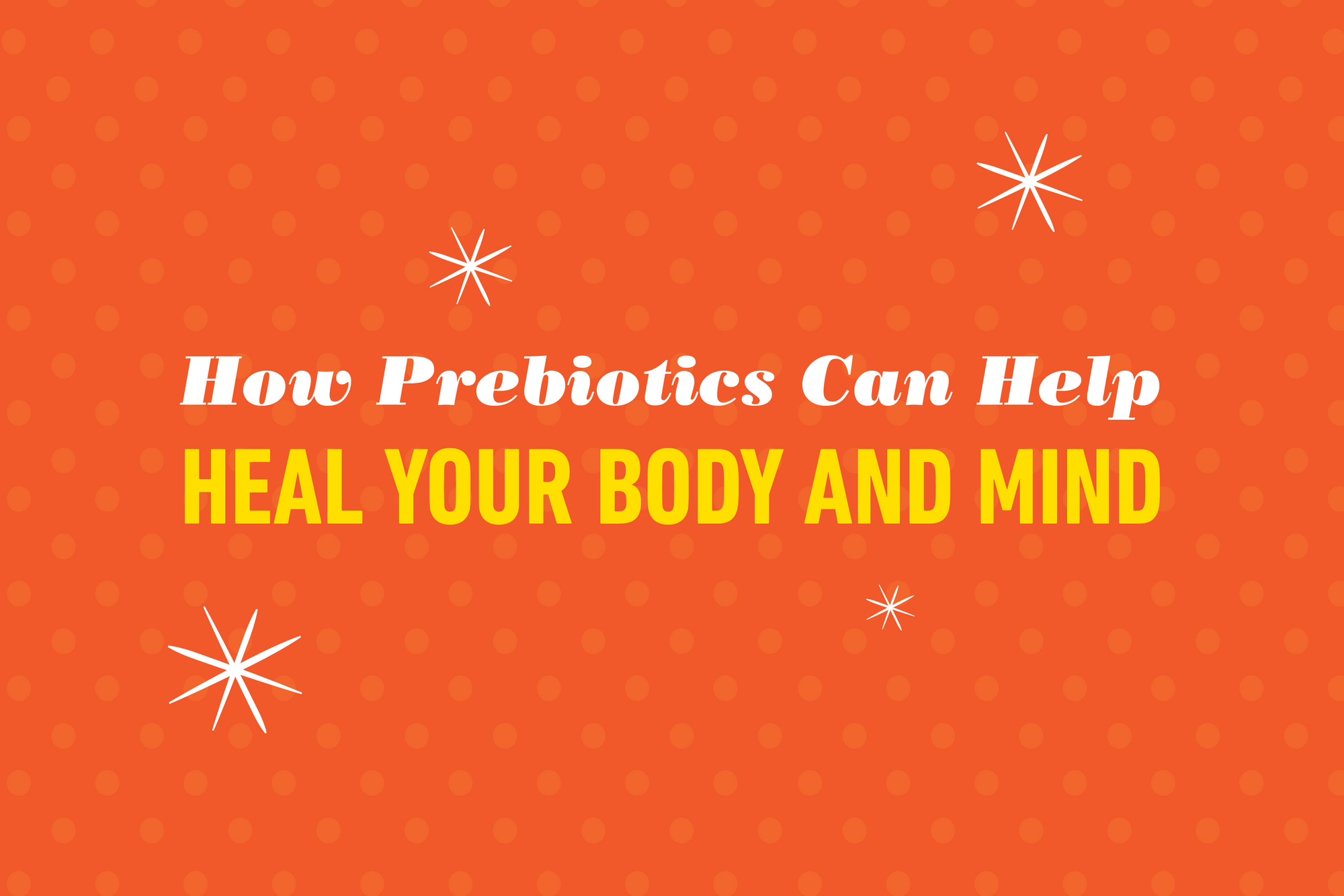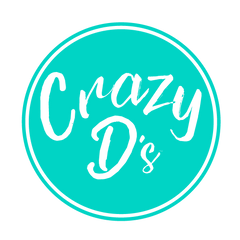

· By Vicky Esterhammer
How Prebiotics Can Help Heal Your Body and Mind
Reading Time: 4 min
We don't often associate mental and emotional health disorders with gut health. However, the two are deeply intertwined, connected via the gut-brain axis.
The gut-brain axis refers to the systems of communication between gut microbiota and the brain. Their relationship serves many functions, including balancing mental and emotional health.
What are the Benefits of Prebiotics
If you've ever been in a stressful situation that made you feel sick to your stomach or noticed that your family member with depression experiences constant fatigue, then you've seen and felt the gut-brain axis at work.
While mental health awareness and efforts to curb stigmas have grown exponentially in recent years, only a fraction of the population is aware of how interconnected gut health and mental health truly are in the long-term. There's mounting evidence that suggests it's not just "all in your head."
What it Means to Feel Something in Your Gut: That Gut Feeling
The microbiota or microbes in the digestive tract activate specialized cells in the gut lining that send hormones and neurotransmitters throughout the body. These same microbes also stimulate the vagus nerve, which connects directly to the brain.
The vagus nerve is the longest cranial nerve in the body and sends sensory information to and from your brain and visceral organs. These include the gut, heart, lungs, liver and spleen. Think of it like your body's master control switch.
The gut-brain axis is a two-way communication line, ensuring both organs function correctly and are responsive to the body's needs.
Chemical Communications: Biotic Benefits
Your gut is responsible for many things, including the production and response to chemicals in the brain that regulate mental and physiological processes.
These chemicals, called neurotransmitters, include:
GABA: Gamma-Aminobutyric Acid is a postbiotic amino acid that acts as a neurotransmitter in the brain. It connects to a receptor in the brain to produce a calming effect. GABA is known to ease feelings of anxiety, stress and fear. As a supplement, GABA has even been thought to prevent seizures.
Serotonin: Serotonin is a natural mood stabilizer often referred to as the "happy hormone" that controls emotion and motor skills. A whopping 90% of serotonin is produced in the gut. Imbalanced serotonin levels can cause depression, anxiety, insomnia, and nausea.
Norepinephrine: Norepinephrine is a hormone and neurotransmitter that helps the body respond to stress and exercise. It works with adrenaline to increase heart rate and the blood pumping from the heart. Norepinephrine plays a crucial role in attention, focus, and memory storage.
Dopamine: Dopamine is a neurotransmitter that controls the brain's reward system. It's also largely involved in movement, sending messages from the brain to different parts of the body. Dopamine receptors are essential to neurological processes, and abnormally functioning dopamine receptors have been linked to mental illnesses such as schizophrenia and ADHD.
Acetylcholine: Acetylcholine helps to contract smooth muscles, reduce inflammation, dilate blood vessels, increase bodily secretions, and slow heart rate. It also plays a role in motivation, arousal, attention, learning, memory, and sleep.
Melatonin: Melatonin is commonly known as the "sleep hormone." It's a hormone that the brain produces in response to darkness. Indeed, it helps control sleep and wake cycles.
When your microbiota aren't fed properly, it causes an imbalance of helpful and harmful gut bacteria, thereby affecting the production and reception of neurotransmitters, potentially increasing the risk or worsening mental illness.
The Alarming State of Mental Health in Canada
In Canada, the state of mental health is on the decline, compounded by the COVID19 outbreak, which has left many without proper access to help. In 2020, 40% of Canadians said their mental health had worsened since the start of the pandemic, and 10% were considering suicide.
While certain lifestyle choices might account for the said difference, gut health influences brain behaviour and functions as the two are in constant communication through multiple pathways. Studies have shown that people struggling with mental health have significant differences in their gut than those who do not.
With mental illness on the rise, it's essential to nurture your health by fuelling your body correctly. So, if you're feeling exhausted, irritable, or out of focus, consider that these impairments may be indicative of imbalanced gut flora.
Be Pro Prebiotics
Prebiotics are a type of soluble fibre that travels through the digestive system intact until they reach the large intestine, where they feed our probiotic cells.
Prebiotics have many health benefits and positive side effects, such as stabilizing blood sugar levels, reducing cholesterol levels, producing bile acids, promoting microbiome diversity, and balancing energy by increasing satiety and improving body mass index in overweight patients.
They also play a significant role in brain function, as they can positively alter the gut microbiota. Both probiotics and prebiotics have been shown to reduce levels of anxiety, stress and depression. For example, a recent report found that children with higher levels of dietary fibre were better able to focus in school and avoid distraction.
The connection between mental health and your gut is evident and demonstrates how critical it is to nourish your digestive tract and your overall health.
Heal your body and mind with natural ingredients like yacon root nectar, chicory root, botanical blends and organic fruit juices, like those found in Crazy D beverages. Our goal is to keep your microbiome well-balanced so that you can stay happy and healthy!
Sources
https://www.gutmicrobiotaforhealth.com/how-to-eat-for-a-diverse-microbiota/
https://www.health.harvard.edu/diseases-and-conditions/the-gut-brain-connection
https://www.drperlmutter.com/improved-attention-from-your-child-feed-them-this/
https://www.drperlmutter.com/why-supplementing-with-prebiotic-fiber-makes-sense/
https://www.healthline.com/nutrition/gut-brain-connection
https://www.ncbi.nlm.nih.gov/pmc/articles/PMC4367209/
https://www.ncbi.nlm.nih.gov/pmc/articles/PMC5005185/
https://pubmed.ncbi.nlm.nih.gov/27014255/
https://pubs.acs.org/doi/pdf/10.1021/acs.jafc.5b02404#
https://pubmed.ncbi.nlm.nih.gov/27014255/
https://gutpathogens.biomedcentral.com/track/pdf/10.1186/1757-4749-5-3.pdf
https://www.healthline.com/nutrition/gut-brain-connection
https://www.psycom.net/the-gut-brain-connection
https://www.healthline.com/nutrition/does-all-disease-begin-in-the-gut
- ##Acetylcholine
- ##Canadian Mental Health
- ##chicory root
- ##digestion
- ##digestive health
- ##Dopamine
- ##functional beverage
- ##GABA
- ##gut health
- ##gut-brain axis
- ##health drink
- ##Melatonin
- ##mental health
- ##microbiome
- ##microbiota
- ##neurotransmitters
- ##Norepinephrine
- ##Prebiotic
- ##prebiotic drink
- ##Serotonin
- ##vagus nerve
- ##yacon root
